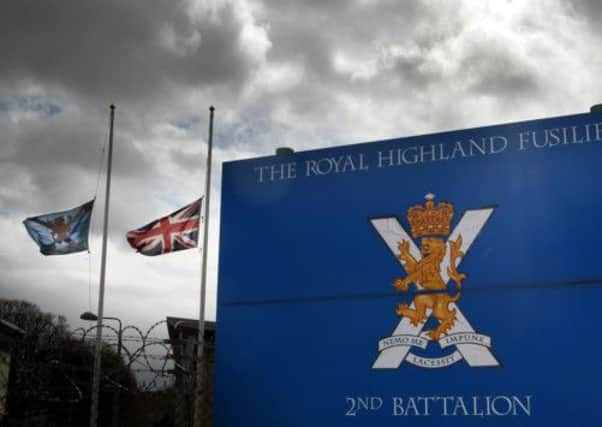Soldiers killed as huge Taliban bomb defeats vehicle’s armour


Corporal William Savage and Fusilier Samuel Flint, both from The Royal Highland Fusiliers, 2nd Battalion The Royal Regiment Of Scotland, and Private Robert Hetherington, from 51st Highland, 7th Battalion The Royal Regiment Of Scotland, died when their heavily-armoured vehicle was hit by a roadside bomb during a routine patrol in the Nahr-e Saraj district of Helmand Province.
The deaths mark the first time British troops have died in an armoured, 23-tonne Mastiff vehicle since it was introduced in 2007 to improve protection against IEDs.
Advertisement
Hide AdAdvertisement
Hide AdThe three soldiers were airlifted to the military hospital at Camp Bastion but could not be saved. It is unclear how badly injured the other six soldiers were.
Cpl Savage’s wife Lyndsey is expecting their first child and was among those to pay tribute last night, saying: “I am completely devastated but extremely proud of ‘Sav’ and everything that he has achieved.
“I have lost the love of my life and the father of our son.”
A statement, from the Flint-Broughton family, said: “Everyone should know that Sam loved his job and made his whole family and everyone that knew him very proud.
Advertisement
Hide AdAdvertisement
Hide Ad“He was a loving son, the protective brother, courageous nephew, the caring uncle, the loyal grandson that anyone would wish to have.”
It is understood the explosion was caused by a large device and officials are looking into whether insurgents are designing bigger bombs aimed at piercing the Mastiff’s heavy armour.
An investigation is expected to not only look at how the bomb was made, but also into how the incident happened, including techniques and checks used by British troops on patrol.
Former army chief of staff Lord Dannatt told Radio 4’s Today programme: “My understanding in talking to the Ministry of Defence is that in all probability it was a very large device in terms of the amount of explosive and it may well have physically lifted up the vehicle and possibly even turned it over.”
Advertisement
Hide AdAdvertisement
Hide AdMr Cameron said the country was paying a “very high price” for involvement in Afghanistan but added: “It is important work because it’s vital that country doesn’t again become a haven for terrorists, terrorists that can threaten us here in the UK.”
A Ministry of Defence spokesman said: “Security in Helmand is steadily improving with Afghan forces already responsible for the bulk of the province – but the environment in which our troops operate remains risky and dangerous, including the threat of improvised explosive devices and insurgent attack. We will continue to do all we can to minimise these risks but they can never be removed entirely.”
The deaths take the number of UK service members who have lost their lives since operations in Afghanistan began in October 2001 to 444.
Six have died so far this year.